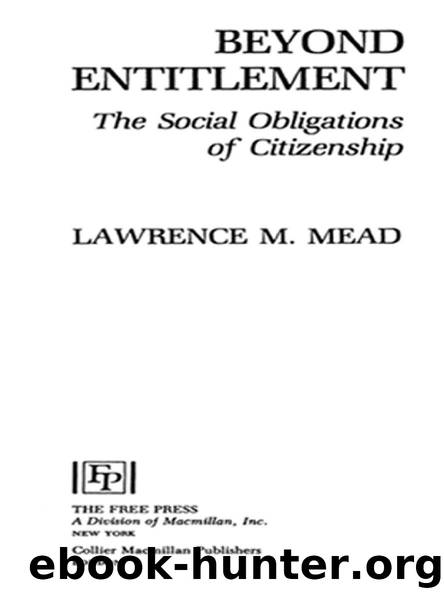BEYOND ENTITLEMENT by Lawrence Mead

Author:Lawrence Mead
Language: eng
Format: epub
Publisher: THE FREE PRESS
Published: 1986-07-15T00:00:00+00:00
The reason staff resources matter for obtained entries is probably that a lot of staff activity in an office convinces clients that the work test is serious, so many of them get jobs on their own. The results confirm that welfare work is a political question much more than an economic one. Whether recipients work is determined mainly by factors policymakers can control. Many welfare people will work if government seriously expects them to. Social and economic conditions are important too, but on balance less so.
The obligation factor was powerful because the administrative processes that led to participation were themselves strongly tied to performance. In New York City each client placed in training or job-readiness activities was worth more than one additional job entry to the office. Conversely, the more clients put in inactive status (UR), the worse an office performed.
Surprisingly, the procedures for adjudicating and sanctioning clients for noncooperation proved to be weakly or negatively linked to performance, even though they might seem to embody WIN’s authority. Overall, the more registrants an office proceeded against in this formal way, the worse it performed. However, two explanations sustaining the role of authority emerged from the interviews. One was that the analysis was done for years when, as mentioned earlier, WIN’s sanctions had been undercut by court decisions. That caused even some effective offices to deemphasize sanctions, weakening their tie to performance. The other reason was that formal authority was not the best way to levy work expectations. The interviews made clear that the best way to convey obligations was informally, earlier in the administrative process. If clients realized when they first entered WIN that the work obligation was serious, they rarely needed discipline later.
The services an office preferred were weakly tied to performance, confirming other research that no one service in WIN is much better than another. But at the same time the total number or proportion of clients assigned to services had a tremendous payoff. The interviews suggested the key to the puzzle: The main thing the services convey is not skills but work obligation. To be assigned to any of those activities involves an obligation to participate regularly, and that is what motivates people to work. WIN’s services have much less impact than the expectations conveyed through them.
These findings apply, strictly speaking, only to New York State. They might not hold entirely for other states or the nation. 28 While the New York offices were fairly representative of WIN offices nationally, New York WIN was below average in both work obligations and performance (the state ranked fifth lowest among the states in job entry performance in 1979, though above average in retention rate). 29 That is one reason obligations explained performance variations within the state so powerfully. Offices with higher participation rates than others realized large gains.
Work obligations seem most important in WIN at the margin. At the low levels of expectations usual in WIN today, nothing can improve performance like higher participation. But if participation rose, at some point declining returns would set in.
Download
This site does not store any files on its server. We only index and link to content provided by other sites. Please contact the content providers to delete copyright contents if any and email us, we'll remove relevant links or contents immediately.
The Secret History by Donna Tartt(16627)
The Social Justice Warrior Handbook by Lisa De Pasquale(11489)
Thirteen Reasons Why by Jay Asher(7788)
This Is How You Lose Her by Junot Diaz(5774)
Weapons of Math Destruction by Cathy O'Neil(5038)
Zero to One by Peter Thiel(4824)
The Myth of the Strong Leader by Archie Brown(4789)
Promise Me, Dad by Joe Biden(4449)
Beartown by Fredrik Backman(4419)
Stone's Rules by Roger Stone(4416)
How Democracies Die by Steven Levitsky & Daniel Ziblatt(4399)
The Fire Next Time by James Baldwin(4343)
100 Deadly Skills by Clint Emerson(4079)
A Higher Loyalty: Truth, Lies, and Leadership by James Comey(4033)
Rise and Kill First by Ronen Bergman(4012)
The David Icke Guide to the Global Conspiracy (and how to end it) by David Icke(3883)
The Farm by Tom Rob Smith(3872)
Secrecy World by Jake Bernstein(3783)
The Doomsday Machine by Daniel Ellsberg(3731)
